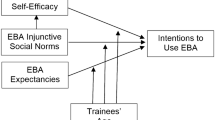Abstract
This study investigated the relationship between individual and job characteristics of mental health social workers and professional dissonance—an experienced conflict between values and job tasks. A 33-item questionnaire, designed specifically for the study’s purposes was utilized. A total of 320 usable study questionnaires were returned (44.5% response rate). The primary study hypothesis, that professional dissonance is related to individual and job characteristics, was partially supported by the data. While job characteristics appeared to have little influence on dissonance, several individual characteristics of the respondents were statistically related to level of dissonance. Specifically, men with the most years of experience and with lower reported attachment to self-determination reported higher levels of dissonance. Study participants affirmed the importance of life-long supervision in managing dissonance in practice.
Similar content being viewed by others
References
K. J. Bentley (1993) ArticleTitleThe right of psychiatric patients to refuse medications: Where should social worker’s stand? Social Work 38 101–106
Bentley, K. J., & Taylor, M. F. (2002). Assisted outpatient treatment/commitment: A step forward or backward for mental health systems and clients? In H. J. Karger, & J. Midgeley (Eds.), Controversial issues in social policy (2nd Ed.). Boston: Allyn and Bacon
D. L. Dennis J. Monahan (Eds) (1996) Coercion and aggressive community treatment: A new frontier in mental health law Plenum Press New York
M. Dewees (2002) ArticleTitleContested landscape: The role of critical dialogue for social workers in mental health practice The Journal of Progressive Human Services 13 IssueID1 73–91
V. E. Frankl (1988) The will to meaning: Foundations and applications of logotherapy EditionNumberExpanded Ed. Penguin Books NY
L. Festinger (1962) A theory of cognitive dissonance Stanford University Press Stanford
L. Festinger (1964) Conflict, decision, and dissonance Stanford University Press Stanford, CA
L. Festinger J. M. Carlsmith (1959) ArticleTitleCognitive consequences of forced compliance Journal of Abnormal and Social Psychology 58 203–210
S. Freedberg (1989) ArticleTitleSelf-determination: Historical perspectives and effects on current practice Social Work 34 33–38
E. Harmon-Jones J. Mills (Eds) (1999) Cognitive dissonance: Progress on a pivotal theory in social psychology American Psychological Association Washington, DC
H. Kutchins S. A. Kirk (1997) Making us crazy: DSM: The psychiatric bible and the creation of mental disorders The Free Press New York
F. M. Loewenberg R. Dolgoff Harrington (2000) Ethical decisions for social work practice EditionNumber6th Ed. F.E. Peacock Itasca, IL
S. R. Maddi (1996) Personality theories: A comparative analysis EditionNumber6th Ed. Cole Publishing Brooks
Margolin, L. (1997). Under the cover of Kindness: The invention of social work. Charlottesville, VA: The University Press of Virginia
R. May (1983) The discovery of being W.W. Norton & Company New York
T. Mizrahi (1992) ArticleTitleThe right to treatment and the treatment of mentally ill people Health and Social Work 17 IssueID1 7–12
M. Moran (2000) ArticleTitleCoercion or caring? American Medical News 43 26–31
A. D. Murdach (1996) ArticleTitleBeneficence re-examined: Protective intervention in mental health Social Work 41 26–31
M. K. Rosenson (1993) ArticleTitleSocial work and the right of psychiatric patients to refuse medication: A family advocate’s response [Point and Viewpoint] Social Work 38 107–112
E. Saks (2002) Forced treatment and the rights of the mentally ill University of Chicago Press Chicago
Taylor, M. F., & Bentley, K. J. (2004). Changing conceptualizations of mental health and mental illness: Implications of “brain disease” and “behavioral health” for social work. Social Work in Mental Health, 2(4), 1--16
Torrey, E. F., & Zdanowicz, M. (2002). Assisted outpatient treatment/commitment: A step forward or backward for mental health systems and clients? In H. J. Karger, & J. Midgeley (Eds.), Controversial issues in social policy (2nd Ed.). Boston: Allyn and Bacon
Author information
Authors and Affiliations
Corresponding author
Rights and permissions
About this article
Cite this article
Taylor, M.F., Bentley, K.J. Professional Dissonance: Colliding Values and Job Tasks in Mental Health Practice. Community Ment Health J 41, 469–480 (2005). https://doi.org/10.1007/s10597-005-5084-9
Issue Date:
DOI: https://doi.org/10.1007/s10597-005-5084-9



